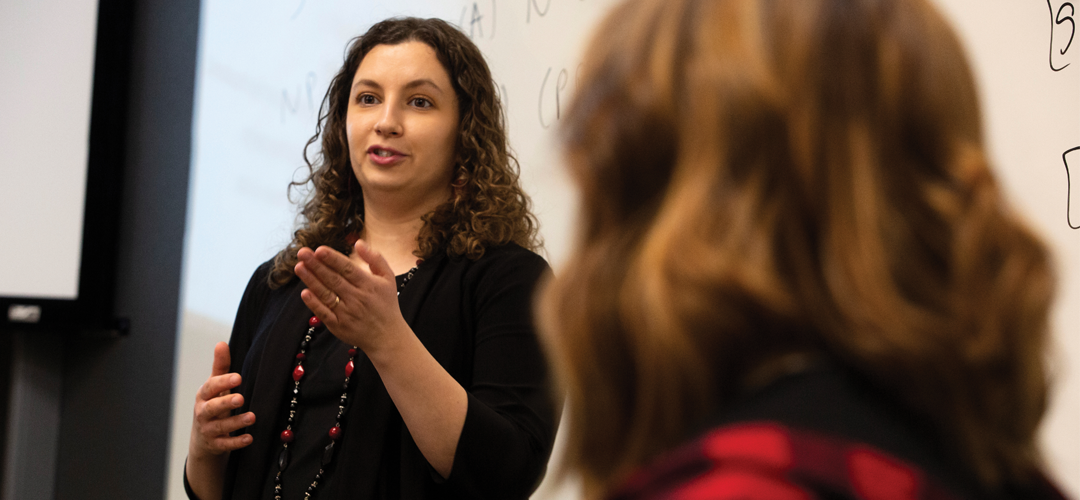

Linguistics is the scientific study of language structure and use. As a uniquely human trait, language is a complex system of elements (such as sounds, signs, and words) combined in systematic ways to accomplish specific purposes in specific contexts. There are approximately 7,000 languages spoken in the world today. One in five American residents report speaking a language other than English at home, and in Texas, this percentage increases to approximately one in three. With the advent of advanced digital technologies and social media, vast amounts of information are shared at a fast pace with diverse audiences. An understanding of what language is and how to use it effectively is therefore a powerful tool for any professional who wants to become an effective communicator in a world marked by diversity, multilingualism, multiculturalism, and globalization.
The Bachelor of Arts in Linguistics prepares you for careers in speech-language pathology, translation and interpreting, Bible translation, language education (including Spanish, ESL, and other languages), foreign service, forensic professions, language and technology, writing, publishing, film industry, language documentation, international development, and other contexts where language and communication are central.
The degree is offered and administered by the Honors College under the direction of its Associate Dean. Students are not required to be members of the Honors College but must apply for admission to the degree program. The B.A. in Linguistics offers the following seven tracks:
- Pre-Speech Pathology Track, which prepares you for direct transfer into a graduate Speech Pathology program
- Bible Translation Track, which equips you for fulltime Bible translation and mission work
- Spanish Language and Culture Track, which qualifies you to work in advanced Spanish contexts
- Language and Technology Track, which prepares you for work in language learning software development and language and technology interfaces
- English as a Second Language Track, which qualifies you to work with international populations and teach ESL
- Forensic Linguistics Track, which prepares you for work in language analysis and criminal code investigation
- World Languages Track, which helps you become fluent in more than one a world language
Linguistics can also prepare you for a variety of other careers in writing, publishing, law enforcement, marketing, film industry, medicine, language documentation, and international development, among others. For questions or further information about the linguistics major, please contact Dr. Olga Pahom.
This course introduces you to principles of language and linguistic analysis. Learn about the major subfields of linguistics, including phonetics, phonology, morphology, syntax, semantics, sociolinguistics, historical linguistics, and language acquisition. The course is helpful for those who want to evaluate spoken or written language data, learn and/or document another language, or pursue further studies in linguistics.
This course introduces you to the speech sounds in human language, including their production, classification, and organization. Learn to recognize and transcribe sounds using the International Phonetic Alphabet as well as analyze the patterns for speech sound distribution in various languages.
In this course, you will be introduced to grammatical analyses of language with a focus on word formation (morphology) and sentence structure (syntax). Learn to classify words, identify inflectional and derivational morphemes, and apply various patterns of word formation. In addition, you will learn to describe constituent structure, identify syntactic categories, and apply phrase structure rules and other syntactic tools in cross-linguistic data analyses.
Sociolinguistics introduces you to the study of language in the social and cultural context. Explore such topics as linguistic variation, regional and social dialects, the effect of culture on language, gender differences in language use, bilingualism, code-switching, and other linguistic phenomena in situations where multiple languages and cultures are in contact.
In this course, you will learn the structure of the second language acquisition process for adult learners and the internal and external factors associated with this process. In addition, explore the distinct but related process of second culture acquisition with the goal of identifying and applying optimal practices for both successful language and culture acquisition.
This course introduces students to various interdisciplinary topics in theoretical and applied linguistics in order to broaden your knowledge and skills related to language study in multiple disciplines. Some of the topics include: gender and language, bilingualism in the U.S., first and second language acquisition, second language and ESL teaching methods, language and the brain, language and writing, conversational storytelling, forensic linguistics, psycholinguistics, historical linguistics, semantics, pragmatics, computational linguistics, and other language-related topics with a strong multicultural component.
Note: Up to six hours of language-related coursework from other disciplines can count towards the linguistics minor with the approval of the linguistics minor coordinator.
For questions or further information, please contact Dr. Olga Pahom at Olga.Pahom@LCU.edu